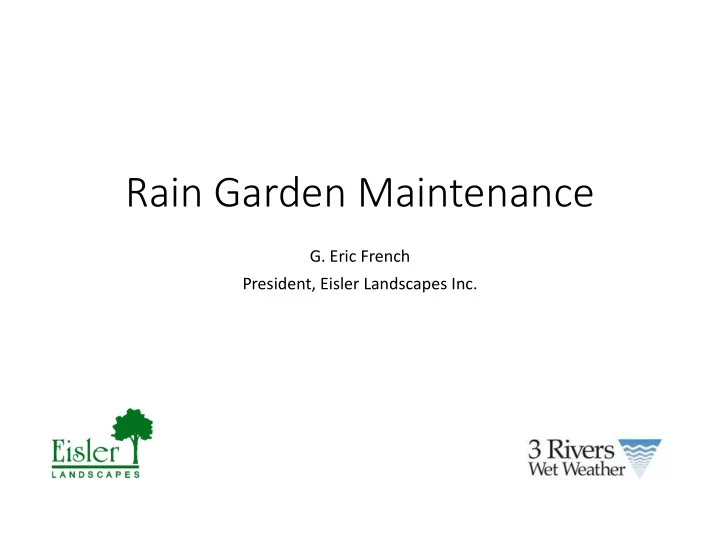

Rain Garden Maintenance G. Eric French President, Eisler Landscapes Inc.
All successful rain gardens are based on a defined drainage area Drainage Area Rain Garden Location
Run off is calculated using site specific Information Site Information Type Area Runoff coefficient Roof 3,000 s.f. 0.75 Lawn 7,168 s.f. 0.18 • Determine surface types and area, Design Storm Information • And runoff coefficients Precip. Frequency Duration 1 year 2 year 5 year • Chart selected design storms 5-min 0.315 0.376 0.455 10-min 0.489 0.587 0.707 15-min 0.600 0.717 0.868 30-min 0.794 0.96 1.19 60-min 0.969 1.18 1.49 2-hr 1.100 1.34 1.69 3-hr 1.170 1.41 1.78 6-hr 1.410 1.7 2.11 12-hr 1.660 1.98 2.45 24-hr 1.950 2.32 2.83 Data from NOAA Precipitation Frequency Data Server 8/10/11, Station Name: Emsworth L/D Ohio River, 36- 2574; http://hdsc.nws.noaa.gov/hdsc/pfds/pfds_map_ cont.html?bkmrk=pa
Runoff Volumes are then calculated to size the RGA • Runoff Volume in Cubic Feet= Runoff Volumes Precip. Frequency A x C x P Duration 1 year 2 year 5 year 5-min 1,115 c.f. 8,342 gal. 1,331 c.f. 9,958 gal. 1,611 c.f. 12,050 gal. 10-min 1,731 c.f. 12,950 gal. 2,078 c.f. 15,545 gal. 2,503 c.f. 18,723 gal. A= Area 15-min 2,124 c.f. 15,890 gal. 2,538 c.f. 18,988 gal. 3,073 c.f. 22,987 gal. 30-min 2,811 c.f. 21,027 gal. 3,399 c.f. 25,424 gal. 4,213 c.f. 31,515 gal. C= Runoff Coefficient 60-min 3,430 c.f. 25,662 gal. 4,177 c.f. 31,250 gal. 5,275 c.f. 39,459 gal. 2-hr 3,894 c.f. 29,131 gal. 4,744 c.f. 35,487 gal. 5,983 c.f. 44,756 gal. P=Precipitation 3-hr 4,142 c.f. 30,985 gal. 4,992 c.f. 37,341 gal. 6,302 c.f. 47,139 gal. 6-hr 4,992 c.f. 37,341 gal. 6,018 c.f. 45,021 gal. 7,470 c.f. 55,879 gal. 12-hr 5,877 c.f. 43,962 gal. 7,010 c.f. 52,436 gal. 8,674 c.f. 64,883 gal. • Runoff Volume in Gallons= 24-hr 6,903 c.f. 51,642 gal. 8,213 c.f. 61,440 gal. 10,019 c.f. 74,946 gal. c.f. x 7.48051948
Calculate Infiltration Rate • Generate custom report from USDA Native Soils Infilration Rate Web Soil Survey D=T p K D=Depth http://websoilsurvey.nrcs.usda.gov/app/ T p =Permited ponding time, here 3 days or 72 hours HomePage.htm K=infilration rate in ft/day, here .54 x .5* D=72 x .54 x .5 • Look up infiltration rate in Landscape D= 19.44 Graphic Standards * “Soil infiltration rate K depends on soil texture. During construction, • Calculate infiltration rate compaction must be avoided in order to preserve infiltration capacity. Nevertheless, inadvertent compaction and sedimentation reduce infiltration rate, so in design a safety factor is applied to K, commonly equal to 0.5; in other words, the infiltration rate used in design is in effect half of the value indicated the soil texture.” -Landscape Graphic Standards
Calculate storage capacity per S.F. of Rain Garden • Look up porosity rates of material Storage Capacity per s.f. of rain garden S=RP+D based on soil report S=Soil Water Storage • Calculate Storage Capacity per Square R=Rooting Depth P=Porosity of material Foot of Rain Garden Gravel= 0.4 Soil= 0.6 D=Depth of ponding Depth of Soil (gravel bed 1/2 of soil depth) Height of * Note: does not include absorption Weir 1 2 3 4 12 in. 13.5 gal./s.f. 19.4 gal./s.f. 25.4 gal./s.f. 31.4 gal./s.f. rates of plant materials 18 in. 17.2 gal./s.f. 23.2 gal./s.f. 29.2 gal./s.f. 35.2 gal./s.f. 24 in. 20.9 gal./s.f. 26.9 gal./s.f. 32.9 gal./s.f. 38.9 gal./s.f.
Rain Garden Plan Trees Rock & Gravel Outfall Areas Weir Shrubs Perennials
Typical Rain Garden Section *Note: Rain Garden does not have an under drain.
Plant Selection Criteria • Can tolerate standing water • Can tolerate dry conditions • Native plants (or cultivars) are best. Plant communities : • Moist Prairie • Bottom Lands • Seasonal Wetlands • Seasonal color and foliage • Wildlife value
Excavation
Building the Weir
Adding Gravel drainage layer
Making Rain Garden Soil
Finished Grading
Planting
Completed Garden Picture taken after 4 days of steady rain
2 years latter
Common maintenance problems Poor / No Drainage Dead and Dying plants Weeds Little or no water entering rain garden Litter Blow outs
Drainage problems start with poorly draining soils. Notice the under drain to help get excess water out of the rain garden.
Ground water in the bottom of the excavation is a bad sign.
Poor site management causes big problems. This rain garden on a construction site being used as a lay down area during the winter.
Plugged geotextiles are a very common problem. The only good solution is to remove or slice open the geotextile.
Extreme example of no drainage. Water can stand no longer than 72 hours before mosquitos start breeding.
Some soils will just not drain
Auguring can solve some drainage problems in the right type of soils. If you can enter a rock or shale layer the water will start percolating.
Additional underdrainage can be added to alleviate ponding.
This one is holding water!
It is supposed to! It has a liner. Know the design professional’s intent before you start maintenance.
Early spring can be deceiving with rain gardens and standing water. This rain garden is fine, the underlying soils are still frozen.
Weeds and tree seedlings are a common problem just as they are in regular landscapes.
Nutsedge is a huge problem. Moist organic soils are a perfect habitat for Nutsedge.
Rain garden short circuit and excessive siltation from parking lot run off. Not enough water is going to get into this rain garden to do any good.
Another engineer who had no confidence in the dark science of Green Infrastructure
Armoring the edge prevents erosion be careful not to dam out the sheet flow
Salt runoff from parking lots is also a huge problem. Most plants can not stand high salt concentrations in the soil.
Erosion is a common problem, these curb cuts are too small. Solution make them larger and farther away from the inlet.
Common maintenance problems Poor / No Drainage Dead and Dying plants Weeds Little or no water entering rain garden Litter Blow outs
Recommend
More recommend